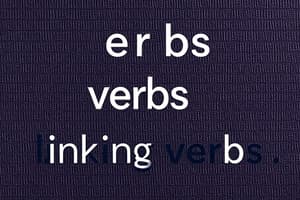Podcast
Questions and Answers
What grammatical role does 'him' play in the sentence 'She gave him a present'?
What grammatical role does 'him' play in the sentence 'She gave him a present'?
- Indirect object (correct)
- Subject complement
- Direct object
- Action verb
Identify the direct object in the sentence 'I saw the movie.'
Identify the direct object in the sentence 'I saw the movie.'
- I
- the
- movie (correct)
- saw
Which of the following verbs is NOT a linking verb?
Which of the following verbs is NOT a linking verb?
- remain
- appear
- become
- think (correct)
What is the subject complement in the sentence 'The flowers are beautiful'?
What is the subject complement in the sentence 'The flowers are beautiful'?
In the sentence 'He feels happy,' what role does 'happy' represent?
In the sentence 'He feels happy,' what role does 'happy' represent?
Which of the following sentences uses a linking verb?
Which of the following sentences uses a linking verb?
Identify the correct example of a linking verb.
Identify the correct example of a linking verb.
Which of the following is a correct definition of subject complement?
Which of the following is a correct definition of subject complement?
What is the subject complement in the sentence: 'The flowers are beautiful'?
What is the subject complement in the sentence: 'The flowers are beautiful'?
Which verb in the sentence 'The cake smells delicious' functions as a linking verb?
Which verb in the sentence 'The cake smells delicious' functions as a linking verb?
Which of the following sentences includes a predicate adjective?
Which of the following sentences includes a predicate adjective?
Flashcards are hidden until you start studying
Study Notes
Grammar: Action and Linking Verbs, Subject Complement, and Object
Action Verbs
- Define: Action verbs express physical or mental activities performed by the subject.
- Examples: run, jump, think, create.
- Types:
- Transitive: Require an object (e.g., She reads a book).
- Intransitive: Do not require an object (e.g., He sleeps).
Linking Verbs
- Define: Linking verbs connect the subject of a sentence to a subject complement.
- Examples: be, appear, become, seem, feel, look.
- Function: They do not show action; instead, they describe a state of being or condition.
Subject Complement
- Define: A subject complement follows a linking verb and provides more information about the subject.
- Types:
- Predicate Noun: Renames the subject (e.g., She is a teacher).
- Predicate Adjective: Describes the subject (e.g., The sky is blue).
Object
- Define: An object receives the action of the verb.
- Types:
- Direct Object: Answers "what?" or "whom?" after an action verb (e.g., He kicked the ball).
- Indirect Object: Answers "to whom?" or "for whom?" the action is done (e.g., She gave him a gift).
Multiple Choice Questions (MCQs)
-
Which of the following is an action verb?
- A) is
- B) feel
- C) seem
- D) become
-
What is the function of a linking verb?
- A) To show action
- B) To connect the subject to the subject complement
- C) To act as an adjective
- D) To introduce a new subject
-
Identify the subject complement in the sentence: "The cat is fluffy."
- A) The cat
- B) is
- C) fluffy
- D) None of the above
-
Which of the following sentences contains a direct object?
- A) She is happy.
- B) They ran swiftly.
- C) He threw the ball.
- D) It seems cold.
-
An example of a predicate noun is:
- A) She is tall.
- B) They are friends.
- C) He feels tired.
- D) The soup tastes delicious.
-
What type of verb is "tasted" in the sentence "The soup tasted salty"?
- A) Action
- B) Linking
- C) Transitive
- D) Intransitive
-
In the sentence "She gave him a present," what is "him"?
- A) Direct object
- B) Indirect object
- C) Subject complement
- D) Action verb
-
Which sentence contains an intransitive verb?
- A) The dog barked loudly.
- B) She wrote a letter.
- C) He made a cake.
- D) They are playing chess.
-
Identify the direct object in the sentence: "I saw the movie."
- A) I
- B) saw
- C) movie
- D) the
-
Which of the following verbs is NOT a linking verb?
- A) become
- B) think
- C) appear
- D) remain
-
What is the subject complement in the sentence: "The flowers are beautiful"?
- A) The flowers
- B) are
- C) beautiful
- D) None of the above
-
In the sentence "He feels happy," "happy" is an example of:
- A) Direct object
- B) Linking verb
- C) Subject complement
- D) Action verb
-
Which of the following sentences uses a linking verb?
- A) She runs every day.
- B) They are students.
- C) He finished his homework.
- D) She jumped over the fence.
-
Identify the indirect object in the sentence: "She told me a story."
- A) She
- B) told
- C) me
- D) story
-
An action verb must always have:
- A) A subject
- B) A complement
- C) An object
- D) None of the above
-
Which verb in the sentence "He seems tired" is the linking verb?
- A) He
- B) seems
- C) tired
- D) None of the above
-
In the sentence "The teacher gave the students homework," "homework" is:
- A) Subject complement
- B) Indirect object
- C) Direct object
- D) Linking verb
-
Which option is an example of a transitive verb?
- A) The sun shines.
- B) She reads books.
- C) They sleep.
- D) He runs fast.
-
In the sentence "She is a doctor," what role does "a doctor" play?
- A) Direct object
- B) Indirect object
- C) Subject complement
- D) Action verb
-
What type of object answers the question "what?" after an action verb?
- A) Subject
- B) Indirect object
- C) Direct object
- D) Complement
Action Verbs
- Action verbs indicate physical or mental activities performed by the subject.
- Examples include: run, jump, think, create.
- Transitive verbs need an object: e.g., "She reads a book."
- Intransitive verbs do not require an object: e.g., "He sleeps."
Linking Verbs
- Linking verbs connect the subject to a subject complement, providing additional information.
- Common examples include: be, appear, become, seem, feel, look.
- They describe a state of being or condition rather than showing action.
Subject Complement
- A subject complement follows a linking verb and gives more information about the subject.
- Types of subject complements:
- Predicate Noun: Renames the subject (e.g., "She is a teacher").
- Predicate Adjective: Describes the subject (e.g., "The sky is blue").
Object
- An object receives the action of the verb.
- Types of objects:
- Direct Object: Answers "what?" or "whom?" (e.g., "He kicked the ball").
- Indirect Object: Answers "to whom?" or "for whom?" (e.g., "She gave him a gift").
Key Concepts for Multiple Choice Questions
- Understanding the distinction between action verbs and linking verbs is essential.
- Recognizing subject complements and their types helps identify their role in sentences.
- Familiarity with direct and indirect objects clarifies their function in sentences.
- Each type of verb (action, linking, transitive, intransitive) has unique characteristics influencing sentence structure.
Studying That Suits You
Use AI to generate personalized quizzes and flashcards to suit your learning preferences.




